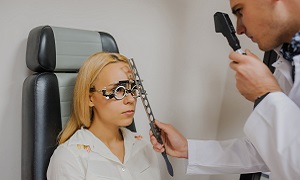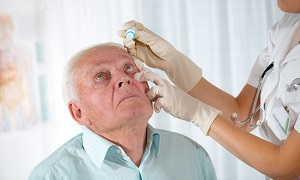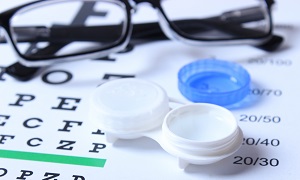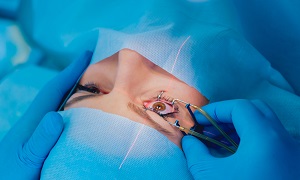Hypermetropia
Hypermetropia, which is also known as hyperopia or farsightedness is a common vision condition in which you are able to see distant objects clearly but nearby objects appear blurry. People having severe farsightedness may be able to see objects only a great distance away, while those with mild farsightedness, can see objects that are closer.
In most cases, this condition is present at birth and tends to run in families.
Symptoms
If your eyes are working hard to see anything up close, and you experience eyestrain, then it may be a symptom of farsightedness.
Some other symptoms include the following:
- Blurry vision for words or objects up close
- Squinting for seeing better
- A headache after reading or similar tasks that require you to focus on something close
- An aching or burning sensation around the eyes
Children can develop strabismus or crossed-eyes if their farsightedness is significant and hasn’t been diagnosed and corrected.
Causes
Your eye has two parts that focus images, i.e. the cornea, which is the clear, dome-shaped front surface of your eye, and the lens, which resembles a candy in size and shape.
In a normal eye, each of these focusing elements has a perfectly smooth curvature, such as the surface of a marble. A cornea and lens with such curvature refract all the incoming light to create a sharply focused image directly on the retina, at the back of your eye.
If the cornea or lens is not curved evenly and smoothly, light rays are not refracted properly, and therefore, you suffer from a refractive error.
When your eyeball is shorter than normal or your cornea is curved too little, it leads to farsightedness or hypermetropia.
Diagnosis
Refraction assessment
To diagnose Hypermetropia or farsightedness, just a basic eye exam is required which includes a refraction assessment and an eye health exam.
A refraction assessment is to determine if you are having vision problems such as nearsightedness, farsightedness, presbyopia, or astigmatism. Your doctor might also use various instruments and ask you to look through several lenses to test your distance as well as your close-up vision.
Eye drops
Treatment
In young people, especially children, treatment is not always required because since the crystalline lenses inside the eyes are flexible enough to compensate for the condition. Depending on how severe the farsightedness is, you may require prescription lenses in order to improve your near vision. This is especially likely as your age increases, and the lenses inside your eyes become less flexible.
Prescription lenses
Prescription lenses are of two types which include:
Eyeglasses
Contact lenses
These lenses are worn right on your eyes. They are available in a variety of materials and designs. You can talk to your eye doctor about the pros and cons of contact lenses and what is the best option for you.
Wearing glasses or contact lenses generally won’t have a significant impact on your lifestyle. Most people are able to adapt quite easily.
Refractive surgery
Refractive surgery is another option to treat Hypermetropia or farsightedness. Surgery involves procedures like LASIK. While this procedure is generally more commonly used to treat nearsightedness, it can also be used to treat farsightedness. This treatment method uses a laser to change your cornea’s curvature so that the light refracts correctly and is able to project a focused image on your retina.
It is notable that refractive surgery is not as safe as wearing glasses. Although it happens rarely, there is a chance that the surgery may damage your vision.
Possible complications of the surgery include:
- Over- or under-correcting the vision
- Infection
- Dry eyes
- Seeing a starburst or halo around lights
Complications
Far-sightedness or hypermetropia can be associated with several other conditions. Some of them include the following:
Crossed eyes – Some children suffering from farsightedness might develop crossed eyes. Specially designed eyeglasses that correct part of or the entire farsightedness might treat this problem.
Eyestrain – If your farsightedness is not corrected it may cause you to squint or strain your eyes for maintaining focus. This can lead to eyestrain and headaches.
Impaired safety – Having an uncorrected vision problem not only jeopardizes your safety but also that of others. This could be serious if you operate heavy equipment or drive a car.
Reduced quality of life – With uncorrected farsightedness, you will mostly not be able to perform a task as well as you want.
Financial burden – The cost of corrective lenses, eye exams, and medical treatments can also add up with a chronic condition like farsightedness.
Prevention
Farsightedness is not generally preventable, but caring for your eyes may reduce the risk.
- Get regular eye exams to detect any problem early
- Get annual checkups if you have any chronic conditions like diabetes or blood pressure, that may affect your vision
- If you have ongoing eye problems such as glaucoma, it is best to follow your doctor’s treatment plan
- Visit your doctor if you develop changes in your vision or if you have eye pain, red eyes, or a discharge from your eyes
You can prevent eyestrain if you protect your close-up vision with proper lighting in your home and your office. It can also help to take breaks throughout the day for resting your eyes. This is important if you spend long periods of time reading or looking at your computer.





